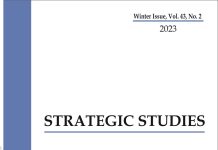Abstract
Rise of Asia has necessitated the greater interconnection and economic integration around the globe. The scope of development is not limited to a nation or a particular region only, in fact, it is taking place across nations as well as regions and sub-regions in Asia. The concept of ‘Economic Corridor’ is used to explain this phenomenon of connectivity. Economic corridors work as a catalyst for regional integration and a driver for inclusive growth by bringing underdeveloped regions into the upward growth trajectory. South Asia is characterised with booming economic growth while economic corridors are playing the role of a catalyst for regional and economic integration. However, such corridors are also creating many political challenges in the region. Hostility among the regional states is a critical factor. In this background, this paper analyses the shaping of economic corridors along regional transport routes and tries to address this question as to how industrial expansion and assortment can bring vibrant change in the region. Moreover, the role of economic corridors is being discussed as a key factor for regional integration in South Asia. The paper also addresses the key political challenges in the implementation of these networks. While discussing the Belt and Road Initiative (BRI), the China-Pakistan Economic Corridor (CPEC) and the Bangladesh-China-India-Myanmar Economic Corridor (BCIMEC) are the main focus of this paper.












